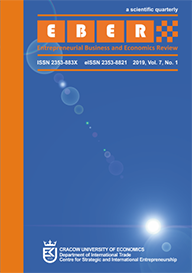The Classroom of the Future: Disrupting the Concept of Contemporary Business Education
The Classroom of the Future: Disrupting the Concept of Contemporary Business Education
Author(s): Anna Tarabasz, Marko Selaković, Christopher AbrahamSubject(s): Economy, Education, Business Economy / Management, Methodology and research technology
Published by: Uniwersytet Ekonomiczny w Krakowie
Keywords: classroom of the Future; business education; economic education;
Summary/Abstract: Objective: The goal of the article is to discuss and elaborate on the skillset required in education of managers and entrepreneurs to face challenges of their future positions. Research Design & Methods: The article is of a descriptive character, based on literature review and its constructive criticism. It presents a case study of S P Jain School of Global Management in Dubai/Mumbai/Singapore/Sydney and experts’ insights. Findings: The classroom of the future, based on idea of design thinking lab, equipped with the most modern solutions of Virtual and Augmented Reality (VR, AR), interactive detachable workstations, shareable smartboards and interactive video display walls, seems to be the passport to success in the digital world. Immersive interaction with AI, ubiquitous computing and technology exposure prepare contemporary business students for future working space, encompassing a variety of problems to be solved, allowing to attain new skills and a smooth transit from education to a desired job or entrepreneurship practice. Implications & Recommendations: The creation of ‘future ready’ graduates requires an innovative mindset and agility to evolve and adapt continuously, with simultaneous focus on disruptive innovation through digital transformation. Incorporating latest digital technologies and innovations into the learning environment seems to be competitive advantage and the key to success on education market. Contribution & Value Added: The article in subsequent chapters lists the awaited skills of future entrepreneurs and managers, indicates available solutions and technologies to boost classroom experience and gives a practical example of technology use. Moreover, it indicates transformation pathway for business schools to embrace challenges of the future labour market and equip their graduates with hands-on experience and required skills.
Journal: Entrepreneurial Business and Economics Review
- Issue Year: 6/2018
- Issue No: 4
- Page Range: 231-245
- Page Count: 15
- Language: English

